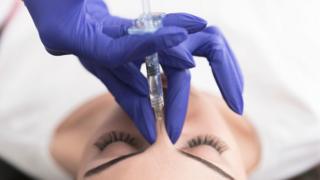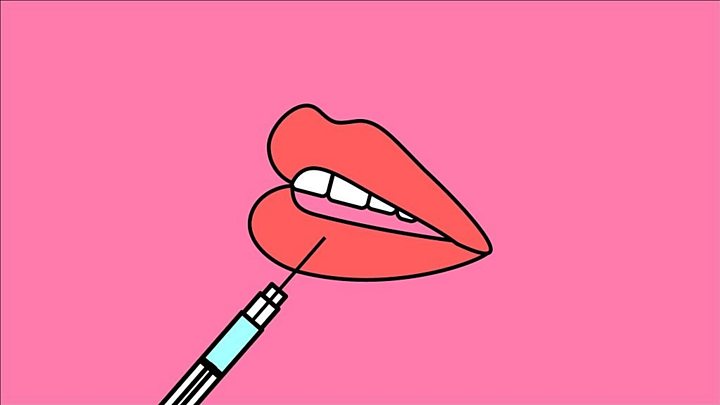[ad_1]

Image copyright
Getty Images
By the time Sarah was 17, she had spent £15,000 on 30 cosmetic procedures without having to prove her age.
Sarah – not her real name – developed anorexia in her early teens and was treated successfully at an eating disorder clinic.
But then her obsession over food changed to one over her looks – her nose in particular.
Sarah’s mother Mary, also not her real name, says: “Sarah’s obsession with her nose led her to have all sorts of fillers to ‘fill in’ the bump, and then to try and turn it up at the end.”
Mary adds that some clinics then tried to encourage Sarah to have lip fillers done as well.
Sarah did not have her parents’ permission for the procedures, so she used their credit card details via PayPal or apps, and was never asked for a physical payment. She also claimed to be 20, but no-one carrying out the procedures asked her for proof.
Sarah had started by going to local beauty salons, but soon moved on to clinics in and around London’s Harley Street.
From the age of 16, she had begged her parents for a nose job, but they said she was too young.
Then one day, Mary’s husband got a £6,500 credit card bill.
“We both immediately knew what she’d done,” says Mary. “It turned out that very next day she’d arranged to have a surgical nose job. She begged; she pleaded to have this done.”
The clinic was well-known and the doctor highly reputable, so Mary and her husband relented and took Sarah to have the procedure.
Image copyright
Getty Images
After the surgery, the teenager was “delighted” for a few days – but the feeling wore off. She has since spent a further £5,000 on other cosmetic procedures.
“She thought once she’d had this nose job, she was going to feel different,” says Mary.
“It was going to be the answer to everything – and it absolutely wasn’t. I think that’s part of why she now feels even worse.
“Initially I was furious. Now I realise she is really very unwell.”
What Mary and her husband find “absolutely staggering” is that Sarah, who has had some very serious mental health issues as well as underlying Asperger’s syndrome, has been able to access all these procedures without ever having to prove her age.
“I think the minimum that the industry must do is ask for some form of ID. You can’t go into a supermarket or even the local corner shop to buy a bottle of wine without a formal ID,” Mary says.
Image copyright
Getty Images
Caroline Payne, of the British Association of Aesthetic and Plastic Surgeons (BAAPS), says: “The young woman involved here is a vulnerable young person, but her experience tells you all you need to know about how easy it is to get this stuff done.
“There should be a very rigorous consent, and proof of identification.
“This is not the first time I’ve heard of this sort of case, and it highlights the problems with the cosmetic industry at this time.”
‘Unnecessary, inappropriate procedures’
Clinics are only regulated if they offer surgical procedures, but non-surgical procedures make up 70-80% of all the cosmetic treatments that are undertaken in the UK, says Ms Payne.
She adds: “It’s non-regulated, that means there’s no rules, no permissions and no laws.”
BAAPS recommend aesthetic procedures on patients under the age of 18 “should be exceptional and only undertaken after a full assessment of the risks and benefits, including the health and psychosocial consequences”.
It also recommends that the patient should include their parents or guardians in the consent process, but it is not legally required.

Media playback is unsupported on your device
By contrast, Ms Payne points out, the tattoo industry is heavily regulated.
It is “absolutely against the law” to tattoo somebody who is under 18, she says. Tattooists must have local authority accreditation, and display their certificate in their tattoo parlour.
BAAPS is working with the government, the Royal College of Surgeons, and the General Medical Council to develop a certification of accreditation for cosmetic clinics.
A Department of Health spokeswoman said: “We’re concerned by reports that vulnerable people are able to access cosmetic procedures without a thorough assessment of their wellbeing.
“Options are currently being considered to help people make informed decisions, including introducing age restrictions on accessing certain cosmetic treatments and improving safety.”
Sarah’s parents have complained to as many clinics as they have been able to track down.
Many have refunded their money but others have made it very difficult, claiming client confidentiality.
Listen to the interview on Woman’s Hour via BBC Sounds.
[ad_2]
Source link
